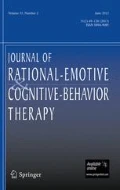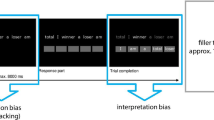Abstract
Recent etiopathogenic theories of gastrointestinal conditions state that information processing biases can be a possible major factor involved in the aetiology and maintenance of these conditions. This exploratory study investigated the role of attention biases (AB) towards symptoms-related cues in gastrointestinal patients with respect to symptom maintenance, simultaneously taking into consideration the role of irrational beliefs. We included 32 patients diagnosed with gastrointestinal conditions. Patients completed a battery of psychological tests and an experimental task aimed to measure the preferential attention processing of linguistic stimuli related to gastrointestinal symptoms when they compete for attention resources with neutral stimuli. AB was positively related to irrational beliefs [r(31) = .376, p = .037] and analgesics use [r(32) = .518, p = .002], but not to self-report gastrointestinal symptoms [r(30) = −.165, p = .382]. Irrational beliefs correlated with pain catastrophizing [r(31) = .373, p = .039], but not to gastrointestinal symptoms, pain intensity, visceral sensitivity or negative emotions; however, pain catastrophizing correlated with all of these. Taken together, our results suggest that core irrational beliefs action as general vulnerability factors that trigger specific implicit and explicit cognitive mechanisms (i.e., AB, pain catastrophizing) involved in the onset and maintenance of symptoms. Future experimental studies should test the robustness of these results in larger samples and aim to further advance our understanding of how cognitive factors interact and potentiate each other in generating and maintaining debilitating suffering.
Similar content being viewed by others
Notes
The neutral words used for practice phase were different from the neutral words used during bias assessment.
The lack of statistical significance may be a direct consequence of the small sample size.
References
Afzal, M., Potokar, J. P., Probert, C. S. J., & Munafò, M. R. (2006). Selective processing of gastrointestinal symptom-related stimuli in irritable bowel syndrome. Psychosomatic Medicine, 68(5), 758–761. doi:10.1097/01.psy.0000232270.78071.28.
Bar-Haim, Y., Lamy, D., Pergamin, L., Bakermans-Kranenburg, M. J., & van IJzendoorn, M. H. (2007). Threat-related attentional bias in anxious and non-anxious individuals: a meta-analytic study. Psychological Bulletin, 133(1), 1–24. doi:10.1037/0033-2909.133.1.1.
Beck, A. T., Rush, A. J., Shaw, B. F., & Emery, G. (1979). Cognitive therapy of depression. New York: The Guilford Press.
Bijur, P. E., Silver, W., & Gallanger, E. J. (2001). Reliability of the visual analogue scale of measurement of acute pain. Academic Emergency Medicine, 8(12), 1153–1157. doi:10.1111/j.1553-2712.2001.tb01132.x.
Blanchard, E. B. (2005). A critical review of cognitive, behavioral, and cognitive-behavioral therapies for irritable bowel syndrome. Journal of Cognitive Psychotherapy, 19(2), 101–123. doi:10.1891/jcop.19.2.101.66787.
Bovenschen, H. J., Janssen, M. J. R., van Oijen, M. G. H., Laheij, R. J. F., van Rossum, L. G. M., & Jansen, J. B. M. J. (2006). Evaluation of a gastrointestinal symptoms questionnaire. Digestive Diseases and Sciences, 51(9), 1509–1515. doi:10.1007/s10620-006-9120-6.
Cash, B., Sullivan, S., & Barghout, V. (2005). Total costs of IBS: Employer and managed care perspective. The American Journal of Managed Care, 11(1 Suppl), S7–S16.
Chapman, S., & Martin, M. (2011). Attention to pain words in irritable bowel syndrome: Increased orienting and speeded engagement. British Journal of Health Psychology, 16(Pt 1), 47–60. doi:10.1348/135910710X505887.
Cisler, J. M., & Koster, E. H. W. (2010). Mechanisms of attentional biases towards threat in anxiety disorders: An integrative review. Clinical Psychology Review, 30(2), 203–216. doi:10.1016/j.cpr.2009.11.003.
Cisler, J. M., Bacon, A. K., & Williams, N. L. (2009). Phenomenological characteristics of attentional biases towards threat: A critical review. Cognitive Therapy and Research, 33(2), 221–234. doi:10.1007/s10608-007-9161-y.
Craske, M. G., Wolitzky-Taylor, K. B., Labus, J., Wu, S., Frese, M., Mayer, E. A., et al. (2011). A cognitive-behavioral treatment for irritable bowel syndrome using interoceptive exposure to visceral sensations. Behaviour Research and Therapy, 49(6–7), 413–421. doi:10.1016/j.brat.2011.04.001.
Cristea, I. A., Szentagotai Tatra, A., Nagy, D., & David, D. (2012). The bottle is half empty, and that’s bad, but not tragic: Differential effects of negative functional reappraisal. Motivation and Emotion, 36(4), 550–563. doi:10.1007/s11031-012-9277-6.
David, D. (2014). Rational emotive behavior therapy (REBT). In R. L. Cautin & S. O. Lilienfeld (Editors-in-Chief) (Eds.), Encyclopedia of clinical psychology. Hoboken: Wiley-Blackwell.
David, D., & Szentagotai, A. (2006). Cognitions in cognitive-behavioral psychotherapies: Toward an integrative model. Clinical Psychology Review, 26(3), 284–298. doi:10.1016/j.cpr.2005.09.003.
David, D., Matu, S. A., & David, O. A. (2013). New directions in virtual reality based therapy for anxiety disorders. International Journal of Cognitive Therapy, 6(2), 114–137.
DiGiuseppe, R., Leaf, R., Exner, T., & Robin, M. (1988). The development of a measure of irrational/rational thinking. Presented at the World Congress of Behavior Therapy, Edinburgh, Scotland.
DiGiuseppe, A. R., Doyle, K. A., Dryden, W., & Backx, W. (2014). A practitioner’s guide to rational emotive behavior therapy. Oxford: Oxford University Press.
Drossman, D., Creed, F., Olden, K., Svedlund, J., Toner, B., & Whitehead, W. (1999). Psychosocial aspects of the functional gastrointestinal disorders. Gut, 45(Suppl 2), II25–II30.
Edwards, R. R., Bingham, C. O., Bathon, J., & Haythornthwaite, J. A. (2006). Catastrophizing and pain in arthritis, fibromyalgia, and other rheumatic diseases. Arthritis Care & Research, 55(2), 325–332. doi:10.1002/art.21865.
Ellis, A. (1994). Reason and emotion in psychotherapy. New York: Carol Publishing Group.
Folstein, M. F., & Luria, R. (1973). Reliability, validity, and clinical application of the visual analogue mood scale. Psychological Medicine, 3(4), 479–486.
Gomborone, J. E., Dewsnap, P. A., Libby, G. W., & Farthing, M. J. (1993). Selective affective biasing in recognition memory in the irritable bowel syndrome. Gut, 34(9), 1230–1233.
Kállay, É., Benga, O., & Ţincaş, I. (2009). Emotion regulation, mood states, and quality of mental life. Cognitie, Creier, Comportament/Cognition, Brain, Behavior, 13(1), 31–48.
Labus, J. S., Bolus, R., Chang, L., Wiklund, I., Naesdal, J., Mayer, E. A., et al. (2004). The Visceral Sensitivity Index: development and validation of a gastrointestinal symptom-specific anxiety scale. Alimentary Pharmacology & Therapeutics, 20(1), 89–97. doi:10.1111/j.1365-2036.2004.02007.x.
Leventhal, E. A., Hansell, S., Diefenbach, M., Leventhal, H., & Glass, D. C. (1996). Negative affect and self-report of physical symptoms: Two longitudinal studies of older adults. Health Psychology, 15(3), 193–199. doi:10.1037/0278-6133.15.3.193.
Levy, R. L., Olden, K. W., Naliboff, B. D., Bradley, L. A., Francisconi, C., Drossman, D., et al. (2006). Psychosocial aspects of the functional gastrointestinal disorders. Gastroenterology, 130, 1447–1458. doi:10.1053/j.gastro.2005.11.057.
Lopes, R. A., Dias, R. C., Querioz, B. Z., Rosa, N. M., Lde Pereira, S., Dias, J. M., et al. (2015). Psychometric properties of the Brazilian version of the Pain Catastrophizing Scale for acute low back pain. Arquivos de Neuro-Psiquiatria, 73(5), 436–444. doi:10.1590/0004-282X20150026.
MacLeod, C., Mathews, A., & Tata, P. (1986). Attentional bias in emotional disorders. Journal of Abnormal Psychology, 95(1), 15–20.
Martin, M., & Chapman, S. C. E. (2010). Cognitive processing in putative functional gastrointestinal disorder: Rumination yields orientation to social threat not pain. European Journal of Pain, 14(2), 207–213. doi:10.1016/j.ejpain.2009.04.008.
Pergamin-Hight, L., Naim, R., Bakermans-Kranenburg, M. J., van IJzendoorn, M. H., & Bar-Haim, Y. (2015). Content-specificity of attention bias to threat in anxiety disorders: A meta-analysis. Clinical Psychology Review, 35, 10–18. doi:10.1016/j.cpr.2014.10.005.
Posserud, I., Svedlund, J., Wallin, J., & Simrén, M. (2009). Hypervigilance in irritable bowel syndrome compared with organic gastrointestinal disease. Journal of Psychosomatic Research, 66(5), 399–405. doi:10.1016/j.jpsychores.2008.09.020.
Shacham, S. (1983). A shortened version of the Profile of Mood States. Journal of Personality Assessment, 47(3), 305–306. doi:10.1207/s15327752jpa4703_14.
Sullivan, M. J. L., Bishop, S. R., & Pivik, J. (1995). The pain catastrophizing scale: Development and validation. Psychological Assessment, 7(4), 524–532. doi:10.1037/1040-3590.7.4.524.
Surdea-Blaga, T., Băban, A., & Dumitraşcu, D. L. (2012). Psychosocial determinants of irritable bowel syndrome. World Journal of Gastroenterology, 18(7), 616. doi:10.3748/wjg.v18.i7.616.
Talley, N. J. (2008). Functional gastrointestinal disorders as a public health problem. Neurogastroenterology and Motility, 20(Suppl 1), 121–129. doi:10.1111/j.1365-2982.2008.01097.x.
Van Bockstaele, B., Koster, E. H. W., Verschuere, B., Crombez, G., & De Houwer, J. (2012). Limited transfer of threat bias following attentional retraining. Journal of Behavior Therapy and Experimental Psychiatry, 43(2), 794–800. doi:10.1016/j.jbtep.2011.11.001.
Walen, S., Digiuseppe, R., & Dryden, W. (1992). A practitioner’s guide to rational-emotive therapy. Oxford: Oxford University Press.
Acknowledgments
This work was possible due to the financial support of the Sectorial Operational Program for Human Resources Development 2007–2013, co-financed by the European Social Fund, under the Project Number POSDRU/159/1.5/S/132400 with the title “Young successful researchers—professional development in an international and interdisciplinary environment”.
Author information
Authors and Affiliations
Corresponding author
Electronic supplementary material
Below is the link to the electronic supplementary material.
Rights and permissions
About this article
Cite this article
Mogoaşe, C., David, D. & Dumitraşcu, D.L. Irrational Beliefs and Attention Bias Towards Symptoms-Related Stimuli in Maintaining Gastrointestinal Symptoms: Results from a Pilot Study. J Rat-Emo Cognitive-Behav Ther 34, 100–113 (2016). https://doi.org/10.1007/s10942-015-0226-7
Published:
Issue Date:
DOI: https://doi.org/10.1007/s10942-015-0226-7




